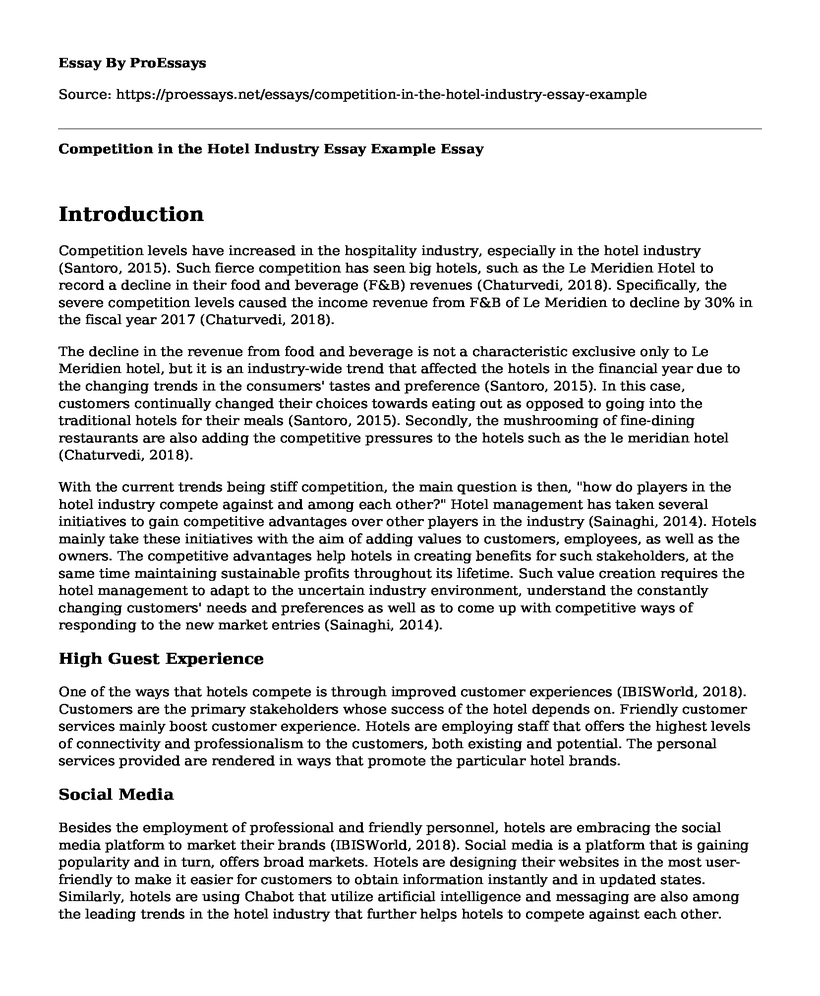Introduction
Competition levels have increased in the hospitality industry, especially in the hotel industry (Santoro, 2015). Such fierce competition has seen big hotels, such as the Le Meridien Hotel to record a decline in their food and beverage (F&B) revenues (Chaturvedi, 2018). Specifically, the severe competition levels caused the income revenue from F&B of Le Meridien to decline by 30% in the fiscal year 2017 (Chaturvedi, 2018).
The decline in the revenue from food and beverage is not a characteristic exclusive only to Le Meridien hotel, but it is an industry-wide trend that affected the hotels in the financial year due to the changing trends in the consumers' tastes and preference (Santoro, 2015). In this case, customers continually changed their choices towards eating out as opposed to going into the traditional hotels for their meals (Santoro, 2015). Secondly, the mushrooming of fine-dining restaurants are also adding the competitive pressures to the hotels such as the le meridian hotel (Chaturvedi, 2018).
With the current trends being stiff competition, the main question is then, "how do players in the hotel industry compete against and among each other?" Hotel management has taken several initiatives to gain competitive advantages over other players in the industry (Sainaghi, 2014). Hotels mainly take these initiatives with the aim of adding values to customers, employees, as well as the owners. The competitive advantages help hotels in creating benefits for such stakeholders, at the same time maintaining sustainable profits throughout its lifetime. Such value creation requires the hotel management to adapt to the uncertain industry environment, understand the constantly changing customers' needs and preferences as well as to come up with competitive ways of responding to the new market entries (Sainaghi, 2014).
High Guest Experience
One of the ways that hotels compete is through improved customer experiences (IBISWorld, 2018). Customers are the primary stakeholders whose success of the hotel depends on. Friendly customer services mainly boost customer experience. Hotels are employing staff that offers the highest levels of connectivity and professionalism to the customers, both existing and potential. The personal services provided are rendered in ways that promote the particular hotel brands.
Social Media
Besides the employment of professional and friendly personnel, hotels are embracing the social media platform to market their brands (IBISWorld, 2018). Social media is a platform that is gaining popularity and in turn, offers broad markets. Hotels are designing their websites in the most user-friendly to make it easier for customers to obtain information instantly and in updated states. Similarly, hotels are using Chabot that utilize artificial intelligence and messaging are also among the leading trends in the hotel industry that further helps hotels to compete against each other.
Hotel Technology
Hotels are investing heavily in the current technologies to help in expanding the guest experiences (Sainaghi, 2014). For instance, the present technology is used in collecting customer information, which is used as important inputs in the CRM process. Customer views are considered, and the foods produced depending on the customers' preferences, which further helps in increasing the value to customers, hence more competitive advantage (Sainaghi, 2014). In the same way, technology is utilized in expediting the check-in, check-out process as well as easy, quick and reliable online reservations for the hotels. The more available these services are, the more competitive a hotel is (Santoro, 2015).
Food menus
The hotels also compete regarding the food menus and ingredients used in manufacturing the foods in the facilities (IBISWorld, 2018). Hotels are turning towards the production of healthy foods, which mainly rely on the locally-sourced ingredients. By including these ingredients in the menus and presenting them in the most eye-catching ways to customers further improves the competitiveness of the hotels in the industry.
References
Chaturvedi, A. (2018). Tough competition eats into hotels' F&B revenue. The Economic Times. Retrieved from https://economictimes.indiatimes.com/industry/services/hotels-/-restaurants/tough-competition-eats-into-hotels-fb-revenue/articleshow/62784086.cms
IBISWorld. (2018). Global Hotels and Resort industry. Industry Market Research Report. IBISWolrd. Retrieved from https://www.ibisworld.com/industry-trends/global-industry-reports/hotels-restaurants/hotels-resorts.html
Sainaghi, R. (2014). Hotel performance: state of the art. International Journal of Contemporary Hospitality Management, 22(7), 920-952.
Santoro, G. (2015). Evaluating Performance in the Hotel Industry: An Empirical Analysis of Piedmont. Journal of Investment and Management. Special Issue: Attractiveness and Governance of Tourist Destinations, 4(1), 17-22.
Cite this page
Competition in the Hotel Industry Essay Example. (2022, Oct 06). Retrieved from https://proessays.net/essays/competition-in-the-hotel-industry-essay-example
If you are the original author of this essay and no longer wish to have it published on the ProEssays website, please click below to request its removal:
- PR as a Management Function
- Analyzing Mixed and Visual Rhetoric for Commercial
- Tesla Motors Inc. Supply Chain
- Data Management in Equifax Paper Example
- Essay Example on FCPA of 1977: Prohibiting Bribery Among Individuals & Companies
- Front-Line Leaders: Building High-Performance Organizations From the Ground Up - Essay Sample
- Essay on Green Products and Consumer Behavior: Understanding Recent Trends in the Marketplace







